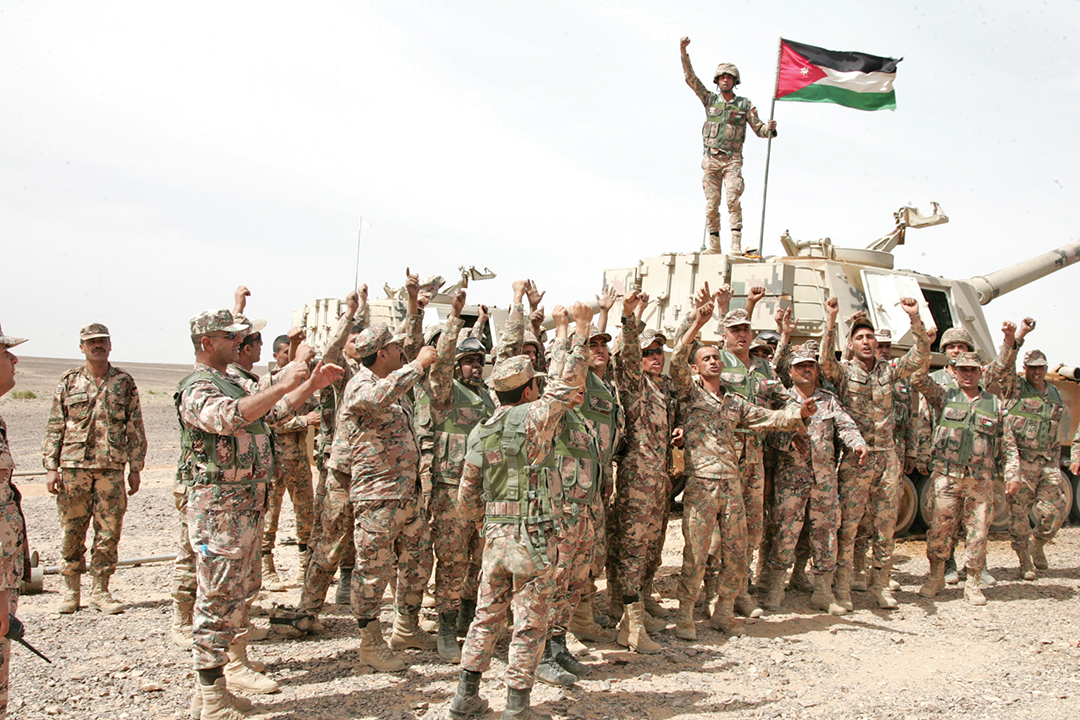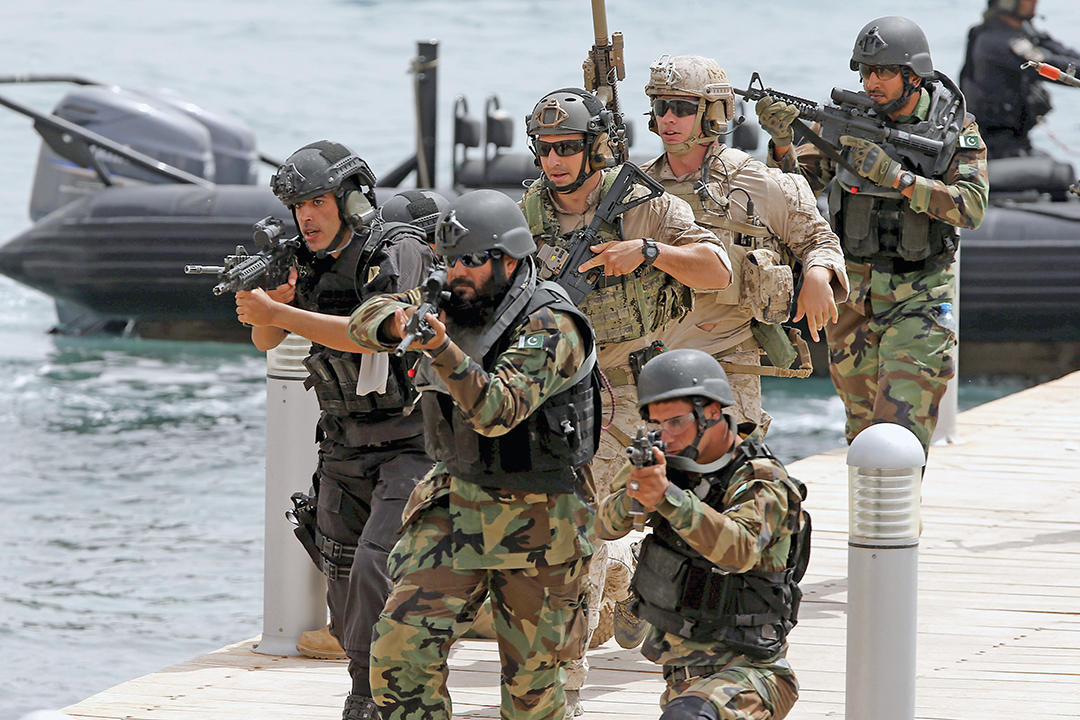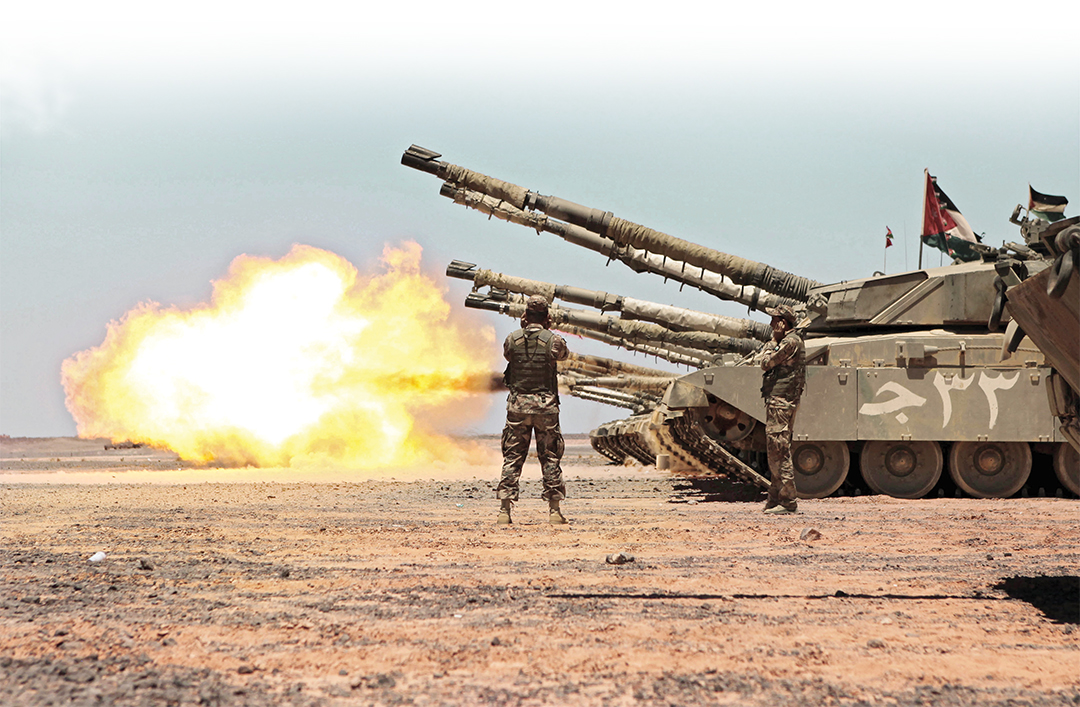Eager Lion Celebrates 10 Years
Jordan has Successfully Hosted Some of the Middle East’s Largest Military Exercises for a Decade
BRIG. GEN. TAWFIQ AL-MARZOUQ, DIRECTOR OF MILITARY TRAINING, JORDAN ARMED FORCES/ARAB ARMY
The Jordan Armed Forces/Arab Army enjoys strategic military relations with many fraternal and friendly states, and foremost among them is the United States, a partner of the Hashemite Kingdom of Jordan in all fields and at various levels. Military exercises, whether bilateral or multilateral, are among the most important products of this partnership. These exercises help strengthen cooperation and coordination among participating states in all military fields.
Military alliances between friendly armies are nothing new but they have become essential in the era of asymmetric warfare because of the lack of a clear battleground and the speed with which the enemy changes tactics, moves from one region to another and opens multiple fronts. Terrorist groups possess the element of surprise, have branches in numerous places around the world, and conceal themselves among civilians. So it has become difficult for an army on its own, no matter how powerful or how much military technology it possesses, to defeat the terrorist organizations. This is why friendly and allied armies began to work as multinational forces in the war against terrorism.

One solution was to conduct small exercises before military units entered the theater of operations. These were limited to training peacekeeping forces. There were no large-scale exercises in Jordan involving multiple scenarios and joint military operations until the emergence of the Eager Lion exercise in 2011.
In June 2011, after five planning conferences stretched over 14 months, the Jordan Armed Forces and U.S. Central Command conducted the first Eager Lion. The exercise involved only the two countries, but its success spurred friendly armies to join the subsequent Eager Lion 12. Participants benefited from the expertise of friendly armies and by employing modern weapons, tactics and technologies. Many took part in Eager Lion 12 with a view toward achieving partnership with fraternal and friendly nations.
One of the most important pillars of the exercise’s success was the close relationship of mutual trust between the U.S. and Jordan. This was exemplified by the joint planning and management of operations through specialized staff. They developed the capacity to plan and execute joint operations, as well as link ministries, governmental and nongovernmental organizations, security agencies and agencies involved in crisis management with the Joint Operations Command in an unconventional operational environment. The exercise also aimed to increase operational harmonization among the participating forces.
The existence of Eager Lion is a paradigm shift in a multinational force environment because the exercise begins with developing scenarios that simulate security threats in the region. Commanders of the participating forces plan the joint military operations, operational concepts are standardized and the cumulative expertise of field commanders from several countries from different fronts and battlefield terrains are drawn upon.
Participating forces conduct joint training and exchange experiences to carry out the assigned task within the exercise scenarios, which helps personnel gain expertise, learn about their counterparts’ patterns of training and preparation, and build friendships that play a significant role while working in a real operational environment.

The exercise aims to train participants in counterterrorism and counterinsurgency operations, border security, evacuations, reconnaissance operations, transport and deployment in a hostile operational environment, protection of vital installations and carrying out logistical support. Scenarios also address conventional threats. In the humanitarian field, the exercise provides an opportunity for participants to confront humanitarian crises during military operations.
From the outset, the exercise was designed to train troops in unconventional warfare to counter violent extremist organizations. The focus in the first exercise was on counterterrorism and counterinsurgency tactics in the training scenarios selected by commanders. Scenarios included a multinational raid on a village occupied by terrorists, a rescue of civilians on a hijacked passenger plane, and a naval attack on a ship hijacked by terrorists. The majority of participants in these scenarios were special operations forces. However, the exercise gave a significant role to conventional forces to thwart cross-border terrorist attacks and engaged crisis management agencies tasked with responding to phenomena such as chemical weapons attacks and refugee flows.
Jordan is located, geopolitically, in the midst of a volatile region, but the secure, stable environment the kingdom enjoys has contributed to enhancing opportunities to carry out many military exercises, including the series of Eager Lions. Moreover, the country’s diverse climate, the availability of different types of training areas and a suitably realistic environment that mimics the challenges of the region made Jordan attractive for conducting regional and international exercises.
After a decade of continued success, Eager Lion has become one of the largest multinational military exercises in the Middle East. Up to 10,000 ground, air, naval and civilian personnel from friendly and fraternal forces routinely participate. In addition to the Jordanian and U.S. forces, the exercise has attracted Soldiers from many countries. For example, 29 countries joined Eager Lion 2019, and NATO military leadership participated for the first time.

A typical Eager Lion goes through several phases, starting with planning and scenario building involving all the countries taking part. Next, the troops arrive and settle into the training areas. Numerous training programs are scheduled for the commanders and the staff running the exercise, as well as for the participating troops. At the end of at least a week of field training comes the constructive criticism phase of the exercise, or “after action review.” It determines the strong points to preserve and reinforce, the weak points to avoid in the future, and the lessons learned from the exercise.
Exercise scenarios have evolved steadily to keep pace with the changing security challenges in the region. For example, in 2016 Jordanian and U.S. forces conducted a biological bomb attack response exercise that was the first of its kind. A year later, participants airdropped leaflets so that the liberating forces could communicate with civilians trapped in cities occupied by terrorists. That scenario simulated a city cut off from contact with the outside world, and the only way to communicate with inhabitants was to drop leaflets.
In Eager Lion 16, the exercise’s concluding scenario included strategic bombardments carried out by two U.S. Air Force B-52 bombers, which entered Jordanian airspace accompanied by Royal Jordanian Air Force aircraft to carry out aerial demilitarization and simulate the scenarios developed for the exercise. Specialized close air support F-16 aircraft and combat helicopters also aided ground forces, in addition to firing organic support weapons at their designated targets, preparing the way for the participating units from other countries to deal with ground targets. Training was conducted on dealing with conventional and nonconventional threats, simulating the prevailing regional environment, with participating troops from the two friendly sides conducting combat operations in built-up areas and operations to clear fortified positions.
A scenario of terrorist attacks using drones has been added, and teams from multinational forces have worked together to thwart this type of attack. In 2019, a scenario had cyber warfare experts from the participating teams track, shoot down, isolate and examine drones of the type increasingly used by terrorists.

As the danger from cyber threats has increased globally, so has their importance in the exercise. Eager Lion 19 saw cyber warfare strongly represented, with cyber security experts from friendly armies implementing a scenario to defend the communications network and the internet from attack. The team succeeded in disrupting the enemy’s attack networks and isolating malware by using electronic communications between devices. The team carried out counterattacks and disrupted the enemy’s communications networks. The cyber experiment was of great interest to the participating countries as it acted as a workshop for the exchange of information and technologies to protect friendly networks and strengthen them against cyber attacks.
In conjunction with the exercise’s activities, a seminar was held for senior military commanders in the region on the latest security challenges. Eager Lion 2019 was attended by Jordanian Chairman of the Joint Chiefs of Staff Maj. Gen. Yousef A. Al-Hnaity and senior military commanders from the invited countries. They discussed the topics of cyber security, countering terrorism and extremist thinking, and dealing with the dangers of chemical and nuclear weapons and devices.
This was attended by commanders at the level of chiefs of staff to discuss ongoing terrorist activities and ways to deal with them. This seminar brought together the views of the commanders of friendly countries’ armies and represented an opportunity to discuss the challenges they face in their areas of responsibility. In conjunction with the senior leader seminar, a noncommissioned officer (NCO) seminar was held for the first time on the sidelines of Eager Lion, with participation of 30 NCOs representing 14 countries, in addition to NATO participants, who develop, reform and strengthen the role of NCOs in the armies of the fraternal and friendly countries.
After participating in multiple exercises and assignments and gaining field experience, imams from the Jordan Armed Forces and their U.S. counterparts expanded their role in the exercise to develop moderate religious discourse to thwart the extremists who distort religious texts to seduce young people. Jordan Armed Forces imams have played a leading role in correcting religious misinterpretations propagated by extremists and exposing their lies. The Amman Message that His Majesty King Abdullah II delivered to the world outlines the peaceful and moderate origins of Islam and rejects extremism. It was jointly prepared by the Royal Al Bayt Foundation for Islamic Thought and a number of leading Muslim scholars and is an incontrovertible illustration of the Islamic values of compassion, mercy, respect for others, tolerance and freedom of religion.
Religious leaders also carried out numerous outreach activities with local people, such as visiting nursing homes and orphanages. Such activities help win the hearts of the people and support the personnel and activities of the armed forces, and so are considered essential in a military operational environment.

Jordanian government institutions serving the exercise include the National Center for Security and Crisis Management, the King Abdullah II Special Operations Training Center and many other centers, institutions and agencies. It is worth mentioning that the National Crisis Management Cell played a major role in Eager Lion 19 as the nucleus managing operations and activating response teams from the security and service ministries. The cell has gained considerable field experience in crisis management through handling a virtual crisis during the exercise.
The experience the National Crisis Management Cell gained from this exercise came in handy during the coronavirus crisis that has affected countries all over the world. The cell has coordinated the work of all government institutions and succeeded in playing a significant national role in mitigating the impact of the pandemic and reducing the spread of the virus among citizens and residents.
Eager Lion is viewed as the most important exercise at the regional level carried out on the territory of the Hashemite Kingdom of Jordan, given the number of countries, the size of the forces of various types involved and the nature of its objectives at the strategic, operational and tactical levels. It’s a tribute to a partnership with the U.S. that strengthens military cooperation and develops the capabilities of troops to confront threats to the region and the world.


Comments are closed.